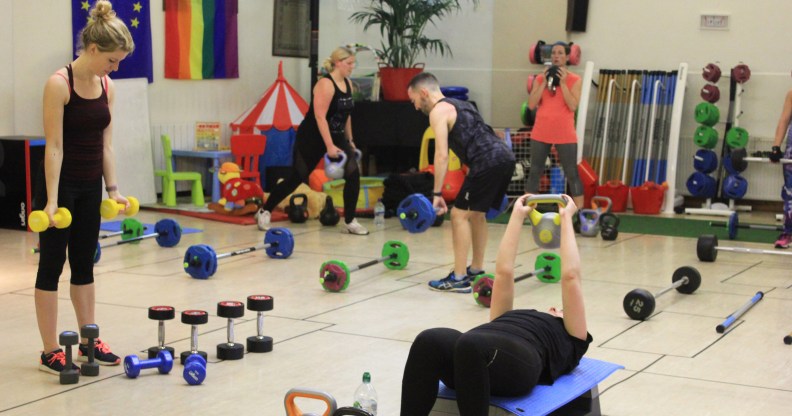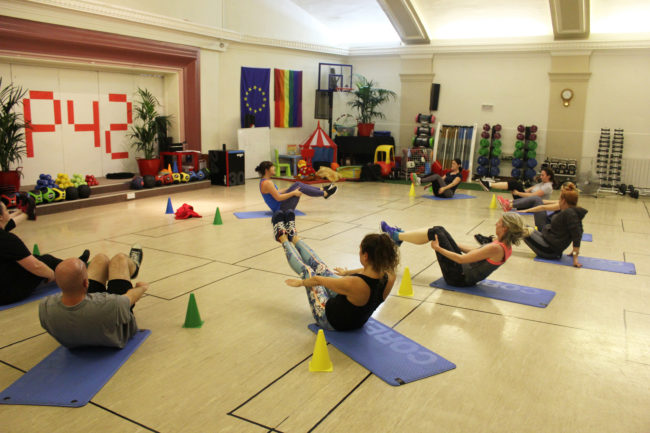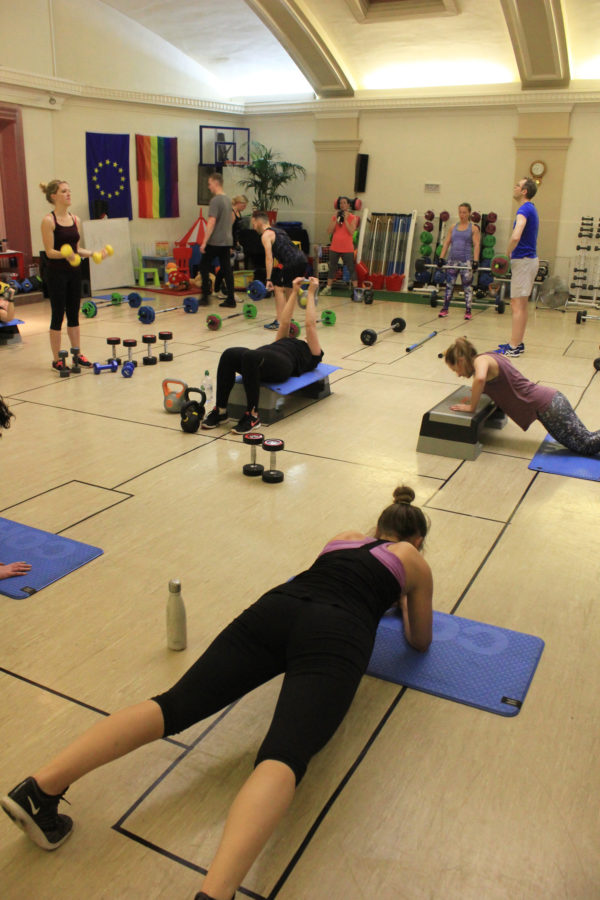Edinburgh gym becomes first in UK to offer free classes for trans people

A Projekt 42 fitness class. (Projekt 42)
An Edinburgh gym is believed to have become the first in the UK to offer free weekly fitness classes specifically for trans and non-binary people.
Projekt 42, a non-profit gym in Leith, has introduced the sessions, which started on Sunday (January 6), with organisers hoping they will provide a safe space for trans people to exercise in the Scottish capital.
The charity runs a variety of fitness sessions with the aim of boosting participants’ mental health through physical exercise.
Projekt 42: We want to provide a safe gym space for trans and non-binary people
Speaking to PinkNews, Matt Whale, studio and activities senior manager at Projekt 42, said: “We believe this is the first time a weekly exercise class for trans and non-binary folx that focuses on gender affirming exercises has been launched in the UK.”
Projekt 42 is offering trans masculine and trans feminine fitness classes, which will be run by non-binary personal trainer Coach Huld.
Huld told PinkNews that trans and non-binary people can choose to go to either of these sessions.

An “abs blast” session at Projekt 42. (Projekt 42)
They added that the sessions were a “growth project,” which would be developed with feedback from participants to “make them inclusive and comfortable for the people that come to them.”
Huld explained that Projekt 42’s free classes provide a vital safe space for gender non-conforming people to exercise in Edinburgh.
“Even though we aren’t explicitly excluded, we don’t feel included.”
—Projekt 42’s Coach Huld
“For me, coming into fitness professionally as a genderqueer person, I recognise how I felt coming into gyms,” they told PinkNews.
“It felt difficult to feel at home in those spaces.”
Huld has said they have seen how being able to exercise in a safe space has made a positive impact on the non-binary clients they’ve worked with.
“You notice the difference within them and how they engage with the gym space as they become more confident, as they start to feel that they can take more ownership of the space,” they said.
Huld added: “Legally, trans people are included in all gym spaces in the UK. But, in practice, that’s not always how we feel.”
In December, it was reported that a trans woman was asked to leave a PureGym women’s changing room by staff, who told her that “no men are allowed.”
“Even though we aren’t explicitly excluded, we don’t feel included,” continued Huld.

A circuits session at Projekt 42. (Projekt 42)
“This is an opportunity for us to allow people to gain that self-confidence and gain that interest.
“They’ll have a healthy and positive relationship with their body so that they might feel able to join with classes that are not specifically for trans people as well, and start training on their own.”
Trans and non-binary people don’t always feel included at the gym, says Coach Huld
The classes will be funded using the proceeds raised from Projekt 42’s affordable sessions and other activities.
Members of the trans masculine and trans feminine fitness classes will also receive a free four-week fitness pass to the Projekt 42 gym.
They will also get a discounted membership to the studio’s other activities.
“I feel by providing a safe space for LGBTQ+ community members to come together, we can help more people work towards positive mental health.”
—Sara Hawkins, founder of Projekt 42
Sara Hawkins, founder of Projekt 42, told PinkNews that the classes were created in part in response to research showing that LGBT+ people suffer from higher rates of mental health problems compared to the general population.
“It’s important to recognise the disproportionate number of community members from the LGBTQ+ community who struggle with mental health illnesses such as depression and anxiety,” Hawkins said.
“I feel by providing a safe space for LGBTQ+ community members to come together, we can help more people work towards positive mental health.”
Studies have shown that trans and non-binary people experience a higher rate of mental health problems than the rest of the population.
In September, research by the University of Arizona in the US found that more than half (51 percent) of trans male teenagers—and 30 percent of trans female teens—have attempted suicide in the past year.
And, in 2016, a study by the NationalCentre for Transgender Equality found that 40 percent of transgender people had tried to end their lives.
Research has suggested that physical exercise can lower the risk of depression for some people, and that there is a link between working out and good mental well-being.
Hawkins explained that the classes seek to provide a place where trans and non-binary people feel comfortable exercising.
“We also recognise the difficultly some people face from the trans community when accessing traditional commercial gyms,” said Hawkins.
“Through building on our already really inclusive community, we can help break some of the barriers people feel exist when accessing fitness and mental health services.”

